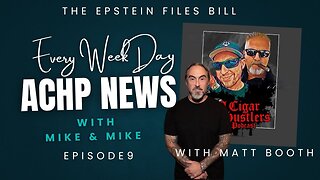Premium Only Content

RFK Jr on Autism: Someone Profited
RFK Jr: "And clearly, there are industries. This comes from an environmental toxin, and someone profited by releasing that environmental toxin into our air, our water, our medicine, our food.
And it suits them to say all of that to normalize it, to say that this is all normal, that it’s always been here. But that’s not good for our country, and it’s not good that the press isn’t more inquisitive.
That it isn’t more skeptical."
Recent research indicates that exposure to environmental toxins during early development may contribute to the risk of Autism Spectrum Disorder (ASD).
While genetics play a major role, an increasing number of studies are examining how pollutants and chemicals interact with genetic factors to influence neurodevelopment.
Key findings from recent studies
Air pollution:
Exposure to fine particulate matter (PM₁₀) during the first year of life has been linked to a higher risk of ASD.
Pollutants such as nitrogen dioxide (NO₂), ozone (O₃), and sulfur dioxide (SO₂), commonly found in urban environments, have been associated with a greater risk of autism, especially when exposure occurs during pregnancy or early childhood.
Heavy metals and industrial chemicals:
Elevated levels of heavy metals like copper and lead, as well as exposure to polychlorinated biphenyls (PCBs) and phthalates, have been linked to an increased risk of ASD.
Prenatal exposure to pesticides and endocrine disruptors has also been implicated in altered neurodevelopment, which may lead to autism.
Food contaminants:
Contaminants such as pesticides, heavy metals, and mycotoxins found in food have been proposed as possible risk factors during pregnancy and infancy.
Gut microbiota:
Recent studies suggest that imbalances in gut microbiota may influence brain development and behavior, pointing to a possible link between gut health and ASD.
Ongoing research and debate
Health and Human Services Secretary Robert F. Kennedy Jr. has launched a federal investigation into environmental factors that may contribute to the rise in autism cases in the U.S., focusing on contaminants like mold, food additives, and industrial chemicals.
However, some experts caution that attributing autism primarily to environmental toxins may overlook the complex interaction between genetic and environmental factors.
While environmental toxins are being studied as potential contributors to ASD, the cause of the disorder is multifaceted, involving a combination of genetic predisposition and environmental exposures.
-
 0:45
0:45
Gateway Hispanic
1 day agoScott Bessent: The Trump economy is about to surge into 2026
3 -
 26:00
26:00
Neil McCoy-Ward
3 hours agoAnd So It Begins… ('Carbon' Food Quotas Are HERE)
1.19K2 -
 1:09:24
1:09:24
Chad Prather
16 hours agoWe Must Obey God: The Gospel That Cannot Be Silenced
53.1K20 -
 LIVE
LIVE
The Mike Schwartz Show
1 hour agoTHE MIKE SCHWARTZ SHOW with DR. MICHAEL J SCHWARTZ 11-25-2025
3,435 watching -
 LIVE
LIVE
LFA TV
12 hours agoLIVE & BREAKING NEWS! | TUESDAY 11/25/25
3,034 watching -
 4:50
4:50
Captain Peach
6 days ago $6.18 earned5 Ways Game Trailers Lie
39.1K2 -
 18:06
18:06
We Got Receipts
19 hours agoLatest EBT Meltdowns That Are Actually Funny!
18.7K25 -
 42:00
42:00
Based Campwith Simone and Malcolm
4 days agoNYT Brands Divorce as the Cool New Trend for Gen Z Girls
20.3K7 -
 11:43
11:43
VSOGunChannel
21 hours ago $3.44 earnedThe Gun Control the Trump Admin is Fighting For
16.5K17 -
 1:03:30
1:03:30
A Cigar Hustlers Podcast Every Day
1 day agoEpisode 416 Epstein Files w/Matt Booth
31.3K